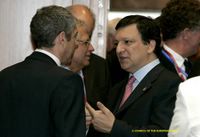Fonte: Council of the European Union
O jornal britânico The Guardian publica hoje uma mega entrevista ao ex-primeiro-ministro português, numa conversa em que o agora presidente da comissão europeia revisita um passado revolucionário e salienta a sua esperança nos próximos seis meses de presidência britânica da UE.
When the world's most powerful men are whisked into the Gleneagles summit next week, at least one leader will feel he can look protesters in the eye. Jose Manuel Barroso has a revolutionary past that would mesmerise the average G8 marcher. At 18 the future president of the European commission was a Maoist best known for pyrotechnic skills which saw him set fire to his university rector's car. Unlike many European students of the early 1970s, who took to the streets as an amusing diversion from comfortable middle-class lives, Barroso was caught up in a genuine revolution in Portugal.
On April 25 1974, a month after his 18th birthday, the young law student found himself on the streets of Lisbon as the rightwing Portuguese dictatorship finally fell. But there was little time to rejoice as his fellow Maoists then fought to ensure a Soviet-backed dictatorship did not seize power.
"I am very proud of that period," Barroso, now 49, says of his former clandestine life. "It was a period of political idealism, great mobilisation, energy. You have to understand that to have a revolution when you are 18 years old is completely different from normal political leaders who were born in a democracy and will die in a democracy and never to have experienced that change. I have seen that change."
Life underground was not all intense conversations about overthrowing capitalism.
One of the revolutionaries' key roles was to pass round copies of the Jane Birkin and Serge Gainsbourg song, Je T'Aime ... Moi Non Plus, which had been banned.
"It was a very conservative dictatorship," Barroso recalls. "I was proud to have participated at a very modest level."
Barroso's track record - and his excitement in recalling his underground days - gives him a credibility that beats all other European commission presidents who have tended to be grand and remote or simply detached from reality.
Where Romano Prodi, his immediate predecessor, talked in romantic but dotty terms about the European dream, Barroso uses practical language about how the EU must deliver jobs and economic growth.
Barroso's grand suite of offices on the 13th floor of the mighty Berlaymont building in the heart of the EU quarter in Brussels has been transformed.
Pictures of grand European figures in a long corridor leading to his suite have been replaced by pencil drawings by the Portuguese artist Ana Hatherly and black and white photographs of artists by Fernando Lemos.
Meetings usually start late as guests stop to look at large paintings provided by Portugal's Gulbenkian Foundation.
But as he meets Tony Blair and the rest of the cabinet in London today to mark the first day of Britain's six month presidency of the EU, Barroso knows that Europe is facing a genuine crisis.
The double rejection of the EU constitution in France and the Netherlands was quickly followed by a bust-up at last month's European summit when leaders failed to agree a budget.
In an interview with the Guardian to mark today's visit to London, Barroso says: "The British presidency comes at a crucial moment. It is almost a cliche to say that but this time it happens to be true.
"There are a lot of anxieties and those are political anxieties that come when the situation is a difficult one, where we understand that Europe, the European idea, has not had the same level of support that it had before.
"So I hope the British presidency will give a contribution and I have every reason to think it will."
As Portugal's centre-right prime minister, who rammed through controversial economic reforms in the face of a recession, Barroso was a natural soulmate for Mr Blair, who skilfully engineered his appointment as commission president last year.
But events have conspired to ensure that Barroso has not lived up to the billing, at least in the eyes of some British officials.
Badly damaged by the Rocco Buttiglione affair last year, when he appointed a rightwing homophobe as justice commissioner, Barroso found himself severely tested by the double rejection of the constitution.
Some British ministers felt that he had leaned too far into the federalists' camp when he initially called on countries to continue ratifying the constitution after the French no.
Others say Barroso had a delicate balancing act to perform and that he can now speak his mind as he makes clear the constitution is heading for comfortable retirement in the proverbial long grass.
"We will not have the constitution in the next years," he says. European leaders agreed last month to halt the ratification process.
If his views on the constitution are not far from Britain's, Barroso adopts a headmasterly tone as he reminds the prime minister that he now has to put Europe's interests first during the six-month presidency.
"Tony Blair has shown great leadership qualities in Britain. I hope he will show now the same leadership qualities in Europe. For that he needs an approach that is inclusive. Dynamic yes. But inclusive."
His carefully worded warning shows that Barroso may end up following his predecessors who invariably ran out of patience with the country regarded as the main EU troublemaker.
But Barroso likes to think he is cut from different cloth to the likes of Jacques Delors, the father of European federalism, who is regarded as the towering commission president, or Jacques Santer, whose commission was, famously, forced to resign.
"World leader who can look protesters in the eye"
Nicholas Watt, European editor





